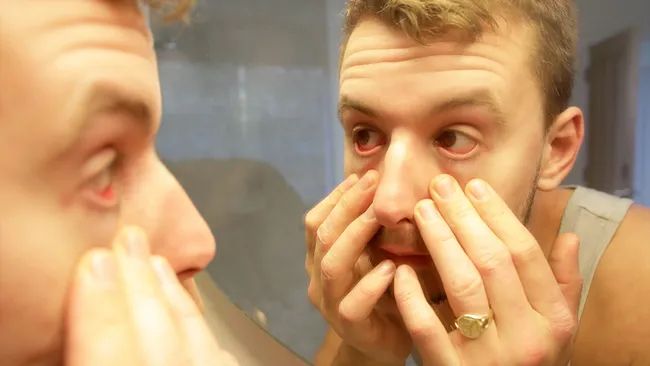
Eyes hurt after the eclipse? Signs of retinal damage, explained (Image Credit: Space.com)
Following the total solar eclipse raced across North America at a whopping 1,500 mph (2,400 km/h) Monday (April 8), drawing the eager eyes of tens of millions of skywatchers, internet searches for “my eyes hurt” seem to be spiking.
So how can you tell if you injured your eyes while watching the eclipse? And if you have, what should you do?
How can an eclipse hurt your eyes?
The only time it’s safe to look at a solar eclipse with bare eyes is during totality, which is when the moon completely blocks the sun. It’s dangerous to look at the sun without special eye protection any other time, including during partial phases of a solar eclipse, when the sun isn’t fully obscured. This is due to a risk of “solar retinopathy,” which refers to damage to the retina — the light-sensitive tissue at the back of the eye — caused by sun exposure or other bright lights.
Typically, protective reflexes, like blinking and pupil contraction, kick in if we glance at the sun on a normal day. During an eclipse, though, these reflexes may not be as robust because the sun is partly covered. This can make it easier to stare at the sun without discomfort — long enough to cause retinal damage.
You wouldn’t necessarily feel this damage happening in real time because “the retina has no sensory nerve fibers,” Dr. Vincent Giovinazzo, interim chairman of ophthalmology at Staten Island University Hospital in New York City, told Live Science after North America’s 2017 eclipse.
That’s why it’s recommended that you view eclipses through an eclipse viewer, a solar filter fitted to a telescope or binoculars, or special eclipse glasses — although, unfortunately, there were counterfeit glasses floating around for this year’s eclipse, Live Science’s sister site Space.com reported.
In theory, looking at an eclipse could also burn the surface of the eye, causing a condition called solar keratitis, NBC reported. But this sort of burn would be much more common among people spending time at high altitudes or in bright, white snow without eye protection, as compared to eclipse watchers.
Signs of eye damage after an eclipse
The main symptoms of solar retinopathy don’t always include pain, but they tend to disrupt a person’s vision, according to the American Academy of Ophthalmology.
For example, symptoms can include having blurred vision or noticing a blind spot toward the center of one or both eyes. People may also experience increased light sensitivity or distorted vision, where straight lines look curved or objects appear smaller than they really are, for instance. Changes in a person’s color vision can also occur because the cells responsible for sensing color are in the retina.
These various vision changes can also give rise to headaches, and people also commonly report eye soreness, wateriness and discomfort, the Cleveland Clinic says.
These symptoms typically show up within about four to six hours of the viewing event, although they could appear the next day, Dr. Nathan Podoll, a spokesperson for the American Academy of Ophthalmology and co-division chief of comprehensive ophthalmology at Vanderbilt University Medical Center, previously told Live Science.
Importantly, though, the symptoms that may show up after an eclipse aren’t necessarily signs of permanent eye damage. In mild cases of solar retinopathy, the symptoms typically go away on their own, although it may take up to six months in some instances, the Cleveland Clinic notes. The New York Times reported that it sometimes takes closer to a year.
In severe cases of the condition, though, the eye damage can be irreversible. An ophthalmologist may suggest that they check your eyes several times across multiple visits, to see if the damage is improving or not; they can diagnose solar retinopathy and judge its severity with a test called optical coherence tomography, an imaging test that uses light to reveal damage and irregularities in the retina.
There’s no specific treatment for permanent damage caused by solar retinopathy, NBC reported.
If it’s not eye damage, why do my eyes feel weird?
If your eyes felt weird after the eclipse but it doesn’t turn out to be retinal damage, what is it?
Staring at anything for a prolonged period can cause eye soreness, The Washington Post reported. That discomfort can arise when the eyes are dried out or when they’ve been focused on something for a long time, for example.
If you viewed the solar eclipse only through certified eclipse glasses, it’s unlikely that your eyes were damaged, Dr. Carl Jacobsen, a clinical professor at the UC Berkeley School of Optometry, told The Washington Post. You may just be experiencing eyestrain — but if any vision changes persist, you should see an eye doctor, he said.
This article is for informational purposes only and is not meant to offer medical advice.





